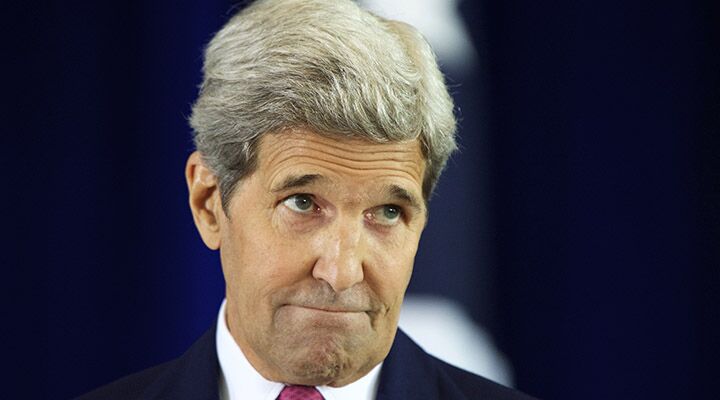
Iran’s Illegal, Inseparable Nuclear and Missile Programs
Throughout the recent Joint Comprehensive Plan of Action (jcpoa) between Iran and the P5+1 nations, dominant subjects were often nuclear facilities, centrifuges and the plutonium heavy water facility at Arak, Iran. But lingering on the periphery was the controversial subject of Iran’s ballistic missile program. Should it be tied to the nuclear negotiations? Could the two programs really be separated?
At first, it appeared that the United States government wanted the missile program to be on the negotiating table. Iran obviously did not. As talks wound on, discussion of the the missile program seemed to disappear.
Today, we see an empowered and emboldened Iranian missile program—one that actually stands in direct violation of United Nations law. The program has not been hindered throughout the jcpoa negotiations, despite the fact that Iran’s missile program can be no more differentiated from the nuclear program than a gun can be from the bullet that it fires.
Iranian President Hassan Rouhani has recently made comments that help highlight the inexorable link that exists between Iran’s nuclear and ballistic missile programs, and the dangers that they pose.
However, U.S. President Barack Obama and the Iranian government have been striving to create a differentiation between the two for their own benefits. Both parties attempt to portray the missile project as defensive and/or non-nuclear. This recently helped the Iranians: It gave them leverage to have the missile program shunted out of the jcpoa. As such, it also helps the Obama administration. By portraying the missile program as non-nuclear, the administration saves some face when it allows the program to be maintained under the jcpoa.
While minimizing the importance of Iran’s missile program enables Washington to garner a deal with Iran, the dire ramifications are becoming clear.
With its missile program legitimized by the U.S. government and the other P5+1 nations, the Iranians are willing to make bold statements such as those from Rouhani’s August 29 address.
During a broadcast on Iranian state television, Rouhani stated that Iran “is not committed to the restrictions on its missile program.” The president continued, “We have formally announced that we are not committed to these provisions mentioned in the UN resolution.”
That’s right. Instead, Iran plans to launch headlong into the research and development of its long-range intercontinental ballistic missiles, along with its intermediate and short-range arsenal as well.
And why can Iran do this? Why is it not scared of violating UN restrictions? Why does it feel unbound and uninhibited? Iran can say and do what it wants with its missiles because the program was not encumbered by the nuclear negotiations in any way. If anything, it was strengthened! At the start of negotiations, the missile program was a red line for the Obama administration. By the time the deal was signed, the UN had promised that all missile program restrictions would expire within the decade.
As shocking as that sounds, it is still apparently too long for Iran, which has now announced it will do as it pleases regardless of UN law.
The cia’s Open Source Center translated more of Rouhani’s August 29 speech:
In general, we have increased our overall deterrence. However, in the defense area, in recent two years, compared to the five or 10 years that preceded these years, there has been greater progress in the defense technology. Our military infrastructure has become stronger and our arsenal of equipment and weaponry has also increased.
Rouhani is touting the fact that, under his leadership, Iran has made more progress within its missile program in the last two years than the decade before! What does that say about where the program is heading?
Furthermore, the comments have another troubling side. They sound remarkably similar to the comments Rouhani made during negotiations back in 2008. As chief nuclear negotiator at the time, Rouhani bragged that, “by creating a calm environment, we were able to complete the work on Isfahan [a nuclear enrichment facility].” He boasted about the enhancement of the nuclear program while negotiations were taking place! Look at what Rouhani is saying today. It seems eerily similar. Iran is getting stronger and enhancing its programs, while at the same time it negotiates with the P5+1 nations that are trying to prevent that very outcome!
Iran’s missile program is inextricably tied to that of its nuclear program. Iran needs nuclear-capable missiles to carry nuclear warheads. Iran has repeatedly threatened the extermination of Israel and the United States. Many wave it away as mere bluster, but that is only because Iran has lacked the capability … until now! That is why Iran has a missile program—to enhance its capabilities and reach its radical goals.
The Trumpet has been warning of the rise of Iran, repeatedly highlighting its empowerment through obtaining nuclear weaponry. Rouhani’s boasting should be an ominous warning to all of us. The Islamic nation’s aspirations and capabilities are not being curbed by the nuclear deal. Iran has every intention of charging ahead with its aggressive military programs—and there is nothing the U.S. or UN will do about it.
